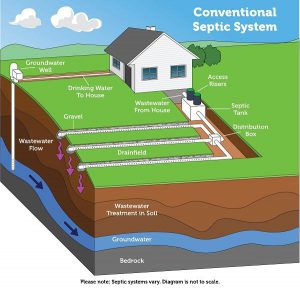
Under the current Wellfield Protection Secondary Zoning Ordinance, new septic systems are banned from being installed within the limits of the Marion County wellfields, and existing septic systems are banned from expanding their capacity. Existing septic system owners inside Marion County wellfields are encouraged to connect to the municipal sanitary sewer system and close their septic systems.
Why are septic systems a problem in wellfields?
If a septic system is not working properly or is does not have regular maintenance performed, contaminants from the septic wastewater can end up in the groundwater. Contaminants can include E. Coli bacteria from fecal material, phosphates and other chemicals from household products and medicines that were flushed down the toilet into the septic system. This groundwater contamination can impact both a privately owned well as well as a public water supply well.
If you currently operate a septic system…
..one option is to consider connecting to the municipal sanitary sewer system. If that is not an option, there are ways to ensure your septic system is working well and not contributing to groundwater contamination.
- Toilets: Do not flush left over medicines or household chemicals into your septic system. Not only can these products leach out into the ground, they may also have a negative effect on the bacteria needed for a septic system to operate correctly. Find a location to return leftover medications and dispose of left over household chemicals at a Marion County ToxDrop location.
- Cleaning Products: Use cleaning products (such as laundry detergents) that are free of phosphates. This helps to reduce the amount of phosphorous in the septic wastewater.
- Garbage Disposal: Place food waste into the trash for pickup or in a composting container/pile instead of down the garbage disposal into the septic system. This will reduce the amount of nitrogen and phosphorous in the septic wastewater and will extend the life of the septic system.
- Regular Maintenance: A septic system should be regularly inspected and pumped out to ensure it is not overloaded and at risk of failure. The typical septic system should be inspected every year by a professional. A septic tank includes a T-shaped outlet which prevents sludge and scum from leaving the tank and traveling to the drain field area. If the scum layer is within six inches of the bottom of the outlet, or if the top of the sludge layer is within 12 inches of the bottom of the outlet, the tank will need to be pumped.
